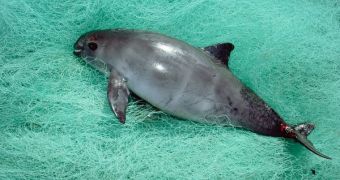The government of Mexico has recently decided to step up the republic's efforts to safeguard local biodiversity. Thus, high officials have announced plans to implement a series of measures aimed at protecting vaquitas living in the Gulf of California.
Recent headcounts indicate that less than 200 vaquitas are left to inhabit the waters in the upper half of the Gulf of California.
Add to this the fact that this species in only known to live in this part of the world, and there's no reason to be surprised that conservationists are very much concerned about the possibility that these porpoises will soon go extinct.
The World Wildlife Fund (WWF) says that the measures instituted by the government of Mexico boil down to gradually phasing out fishing nets that kill these rare marine mammals.
The nets will be substituted by fishing gear that makes it possible for local fishermen to continue doing their job without harming said animals.
The current WWF Mexico's Director General, Omar Vidal, explains the new regulations as follows:
“With this norm, drift gillnets - one of the nets used in artisanal shrimping operations in which vaquitas die incidentally - will be gradually substituted, during a three year period, for selective fishing gears that does not kill this porpoise, but that allow fishers to keep earning their livelihoods.”
During these three years, fishermen in Mexico will get help from both government officials and green-oriented groups in terms of learning how to best make use of the new fishing gear.
“The optimal use of the net requires the development of particular skills; therefore, the support of the government and other organizations through training and temporary compensation programs will be essential along the fisher´s learning curve,” Omar Vidal says.
According to the WWF, Mexico decided to start taking better care of the vaquitas living in the Gulf of California after more than 38,000 people spread across 127 countries signed a petition asking that it do so.
The petition was addressed to Mexico President Enrique Peña Nieto.

 14 DAY TRIAL //
14 DAY TRIAL //